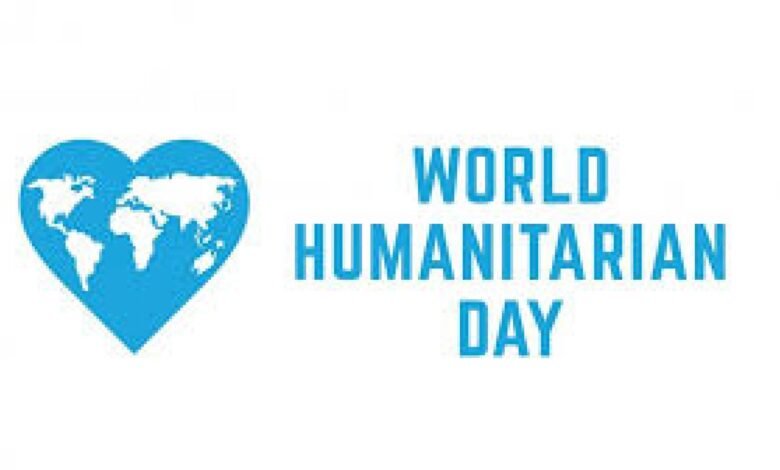World Humanitarian Day 2025: Putting Children at the Center of Community Empowerment and Global Solidarity

Every year on August 19, the world pauses to mark World Humanitarian Day, a time to honor the courage of humanitarian workers and to reaffirm our collective responsibility to those in crisis. The 2025 theme, “Empowering Local Communities and Strengthening Global Solidarity”, is a timely reminder that the true measure of our humanity lies in how we protect and nurture our precious children.
History of World Humanitarian Day
On August 19, 2003, a bombing at the Canal Hotel in Baghdad, Iraq, where the United Nations headquarters was based, claimed the lives of 22 people, including Sergio Vieira de Mello, the UN Secretary-General’s Special Representative in Iraq.
This tragic incident highlighted the dangers faced by humanitarian workers in conflict zones and brought global attention to the risks they endure in the service of humanity.
In 2008, the UN General Assembly adopted a resolution designating August 19 as World Humanitarian Day in remembrance of those who lost their lives in this attack and to raise awareness of the ongoing global humanitarian needs.
Since then, WHD has been commemorated annually with specific themes, uniting humanitarian organizations around the world to:
- Advocate for the well-being, dignity, and survival of communities affected by crises, including children and families.
- Call for the protection and safety of humanitarian workers who risk their lives to help others.
2025 Theme for World Humanitarian Day
The theme for 2025 is “Empowering Local Communities and Strengthening Global Solidarity.”
This theme reflects the core principle of humanitarian assistance: while the international community must unite to respond to crises, it must do so in a way that empowers local communities to become active leaders and decision-makers in shaping their own futures.
It emphasizes:
- Recognizing local communities as change agents rather than passive recipients of aid.
- Strengthening collaboration between international humanitarian organizations and local responders.
- Prioritizing funding for countries most affected by poverty, disasters, conflicts, and where children are at greatest risk.
The Significance of World Humanitarian Day
Every year, World Humanitarian Day honors the countless individuals who work tirelessly to support people in need and raise awareness of humanitarian challenges. It is a day to celebrate humanitarians, to remember those who sacrificed their lives in the line of duty, and to renew commitments to global solidarity.
The day holds special importance because it:
- Honors Humanitarian Workers – Recognizes those working in conflict zones, disaster-hit areas, refugee camps, and epidemic outbreaks.
- Highlights Global Crises – Brings attention to war, famine, displacement, disease, and climate emergencies, which particularly devastate children.
- Promotes Solidarity – Encourages countries and individuals to unite in facing global challenges together.
- Inspires Action – Calls on people everywhere to contribute, whether through donations, volunteering, advocacy, or simply spreading awareness.
Humanitarian workers are often the first to respond to international crises and the last to leave, providing life-saving support, protection, and care. Their work is especially critical for children, who are often the most vulnerable in times of conflict, disaster, and displacement.
Children at the Heart of Humanity
Children bear the heaviest burdens in times of war, natural disaster, displacement, and poverty. They are often the first to lose access to education, healthcare, nutrition, and safe shelter. To empower local communities without centering children is to build on shaky foundation
Empowering Local Communities Through Children
When communities are empowered to care for and protect their children, the ripple effect is profound:
- Education becomes a shield, keeping children safe and preparing them for tomorrow.
- Health systems that prioritize children ensure survival and long-term well-being.
- Child protection structures, whether within families, schools, or neighborhoods, create safe environments where children can thrive.
An empowered community is one where every child is seen, heard, and given the opportunity to grow in dignity.
Global Solidarity for the Next Generation
Strengthening global solidarity means recognizing that no child’s suffering is isolated. The hunger of a child in one part of the world is a call to action for all humanity. Global solidarity channels resources, advocacy, and innovation toward ensuring that local efforts to protect children are not left to struggle alone.
When the world stands together, the child who might have been forgotten gains a voice. The community that might have been overwhelmed gains strength. And humanity takes one more step toward justice, equity, and peace.
Global Humanitarian Challenges
- Humanitarian systems are increasingly overburdened and underfunded, even as crises grow in scale.
- Despite international law protecting aid workers, attacks against them persist.
- Forced displacement, armed conflicts, and climate change continue to endanger millions, with children facing heightened risks of malnutrition, disease, and disrupted education.
Activities for World Humanitarian Day
To mark World Humanitarian Day, individuals, communities, and organizations can:
- Use social media to create awareness about pressing humanitarian concerns and highlight children’s needs during crises.
- Organize awareness walks or community events to show solidarity with humanitarian workers.
- Host seminars or workshops on human rights and child protection, amplifying the voices of local humanitarians.
- Plan fundraising campaigns to support vulnerable groups, particularly displaced children and families.
- Run advocacy campaigns urging international leaders to strengthen humanitarian aid and safeguard humanitarian workers.
A Call to Action
On this World Humanitarian Day, we are called not only to honor humanitarian workers but to recommit ourselves to children. Empowering local communities to protect children while standing in global solidarity with them is not charity; it is responsibility.





